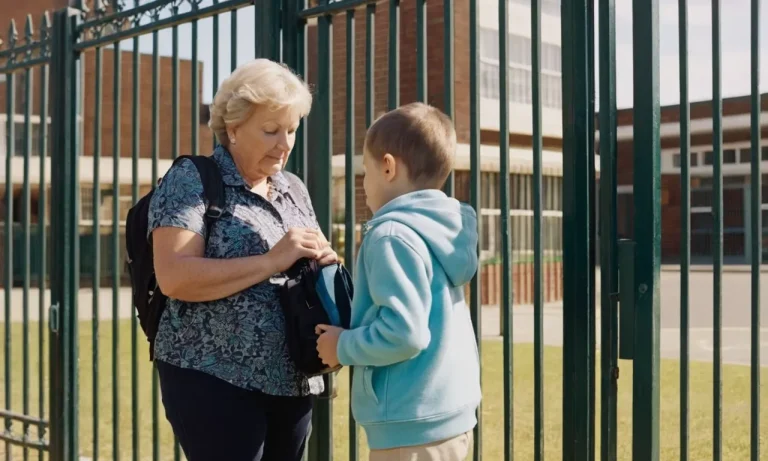Navigating the intricate world of family law requires a deep understanding of legal principles and a compassionate approach. If you aspire to make a difference in the lives of families, choosing the right law school is a crucial first step.
If you’re short on time, here’s a quick answer to your question: Some of the best family law schools in the United States include Georgetown University Law Center, Harvard Law School, and the University of California, Berkeley School of Law.
In this comprehensive article, we’ll explore the top family law schools, their program offerings, faculty expertise, and unique strengths. We’ll also provide insights into the admissions process, career prospects, and what sets these institutions apart in the field of family law.
Factors to Consider When Choosing a Family Law School
Pursuing a career in family law can be both rewarding and challenging. It requires a deep understanding of legal principles, empathy, and a commitment to helping families navigate complex situations. Choosing the right family law school is crucial to your success, and there are several factors to consider.
Reputation and Rankings
The reputation and rankings of a law school can significantly impact your future career prospects. Top-ranked schools often have a strong alumni network, better job placement rates, and attract top legal talent.
However, it’s essential to look beyond rankings and consider other factors that align with your goals and preferences. Reputable sources like U.S. News & World Report and Law School Transparency provide detailed rankings and data to help you make an informed decision.
Faculty Expertise and Research
The quality of the faculty is paramount in your legal education. Look for schools with professors who are actively engaged in family law research, publishing scholarly works, and contributing to the field.
Their expertise and real-world experience can provide invaluable insights and mentorship opportunities. Additionally, consider the faculty-to-student ratio, as smaller classes often allow for more personalized attention and engagement.
Curriculum and Course Offerings
A comprehensive curriculum with a wide range of family law courses is essential for developing a well-rounded understanding of the field. Look for schools that offer specialized courses in areas such as divorce law, child custody, adoption, and domestic violence.
Additionally, consider the availability of interdisciplinary courses that explore the intersections of family law with psychology, social work, or mediation.
Clinical Programs and Experiential Learning
Hands-on experience is invaluable in the legal profession. Look for schools that offer robust clinical programs and externship opportunities in family law clinics, legal aid organizations, or government agencies.
These experiences will allow you to apply your classroom knowledge to real-world scenarios and develop practical skills such as client counseling, negotiation, and courtroom advocacy.
Career Services and Alumni Network
A strong career services department and an active alumni network can be game-changers in your job search and professional development. Look for schools that provide personalized career counseling, on-campus interviews, and networking opportunities with alumni working in family law.
A robust alumni network can also open doors to mentorship, job opportunities, and valuable industry insights.
Choosing the right family law school is a significant decision that will shape your future career. By carefully considering these factors and conducting thorough research, you can find a program that aligns with your goals and provides the best foundation for success in this rewarding field.
Top Family Law Schools in the United States
For those aspiring to specialize in family law, choosing the right law school can greatly impact their future career. Family law encompasses a wide range of legal issues, including divorce, child custody, adoption, and domestic violence.
It is a highly nuanced and emotionally charged field that requires a deep understanding of the law and exceptional interpersonal skills. Here are some of the top family law schools in the United States that offer exceptional programs and prepare students for this challenging yet rewarding area of practice.
Georgetown University Law Center
Consistently ranked among the top law schools in the country, Georgetown University Law Center boasts a robust family law program. Their Family Law Clinic provides students with hands-on experience in representing clients in divorce, custody, and domestic violence cases.
According to the school’s statistics, over 90% of graduates secure employment within ten months of graduation, with many pursuing careers in family law. 🎉
Harvard Law School
As one of the most prestigious law schools in the world, Harvard Law School offers a comprehensive family law curriculum. Students can take courses such as “Family Law,” “Child, Family, and State,” and “Negotiation Workshop.”
Harvard’s Child Advocacy Program and Domestic Violence Clinic provide invaluable practical experience in the field. With its rigorous academics and renowned faculty, Harvard Law School is a top choice for aspiring family law practitioners. 👏
University of California, Berkeley School of Law
Known for its commitment to social justice, the University of California, Berkeley School of Law offers a robust family law program. Students can participate in clinics like the Family Violence Law Clinic and the Child Advocacy Clinic, where they gain hands-on experience representing clients in family law matters.
Berkeley’s alumni network is vast, and many graduates go on to work in prestigious law firms, government agencies, and non-profit organizations focused on family law issues. 😊
University of Virginia School of Law
The University of Virginia School of Law is renowned for its exceptional family law program. Students can take courses such as “Family Law,” “Domestic Relations Practice,” and “Alternative Dispute Resolution.”
The school’s Child Advocacy Clinic provides students with the opportunity to represent children in various legal proceedings, including custody disputes and child welfare cases. With a strong emphasis on practical training and a commitment to public service, UVA Law is an excellent choice for aspiring family law attorneys.
Yale Law School
As one of the most prestigious law schools in the world, Yale Law School offers a comprehensive family law curriculum. Students can take courses like “Family Law,” “Divorce and Child Custody,” and “Domestic Violence and the Law.”
Yale’s Domestic Violence Clinic and Advocacy for Children and Youth Clinic provide students with hands-on experience in representing clients in family law matters. With its rigorous academics, renowned faculty, and commitment to public service, Yale Law School is a top choice for those interested in family law.
👍
Admissions Process and Requirements
Gaining admission to a top family law school can be a highly competitive process, with many applicants vying for a limited number of spots. To stand out from the crowd, it’s crucial to understand the key components of the admissions process and meet the necessary requirements.
Here’s a breakdown of what you can expect:
LSAT Scores and GPA
Your performance on the Law School Admission Test (LSAT) and your undergraduate Grade Point Average (GPA) are two of the most important factors considered by admissions committees. The LSAT is a standardized test designed to measure your logical reasoning, analytical thinking, and reading comprehension skills.
While there’s no minimum LSAT score required, top family law schools typically look for scores in the 90th percentile or higher, according to U.S. News & World Report. Your GPA is also crucial, as it reflects your academic achievements during your undergraduate studies.
Most top programs seek applicants with a GPA of 3.7 or higher on a 4.0 scale.
Personal Statements and Essays
Beyond your academic credentials, admissions committees are interested in learning about your personal story, motivations, and goals. The personal statement and supplemental essays are your opportunity to showcase your writing skills, unique experiences, and genuine interest in family law.
These essays should be well-crafted, engaging, and provide insights into your character and potential contributions to the program. Don’t be afraid to share personal anecdotes or stories that highlight your passion for family law and your commitment to making a positive impact in the field.
Letters of Recommendation
Most family law schools require two or three letters of recommendation from individuals who can speak to your academic abilities, professional achievements, and personal qualities. These letters should come from professors, employers, or mentors who know you well and can provide specific examples of your strengths, achievements, and potential for success in law school and beyond.
It’s essential to choose your recommenders carefully and give them ample time to craft a thoughtful and compelling letter on your behalf.
Interviews and Diversity Considerations
Many top family law schools require or strongly recommend an interview as part of the admissions process. These interviews give the admissions committee an opportunity to assess your communication skills, professionalism, and fit for the program.
They may also ask about your interest in family law and your long-term career goals. Additionally, most law schools value diversity and seek to create a diverse and inclusive learning environment. They may consider factors such as your background, life experiences, and potential to contribute to the diversity of the student body.
😊
Ultimately, the admissions process for family law schools is highly competitive, but by understanding the requirements and presenting a strong, well-rounded application, you can increase your chances of gaining admission to your dream program. Good luck! 👍
Career Prospects and Opportunities in Family Law
Family law is a dynamic and rewarding field that offers a diverse range of career paths for aspiring lawyers. Whether you’re passionate about advocating for children’s rights, helping couples navigate the complexities of divorce, or resolving complex custody disputes, a career in family law can be immensely fulfilling.
Here are some of the exciting opportunities that await graduates of top family law schools:
Private Practice
Many family law graduates choose to join private law firms, where they can represent clients in a variety of family-related matters. This could involve handling divorce proceedings, child custody battles, adoption cases, and prenuptial agreements.
Private practice offers the opportunity to build a client base, develop specialized expertise, and potentially become a partner in a reputable firm. According to the American Bar Association’s Family Law Section, family law practices are in high demand across the country.
Government and Public Interest Organizations
For those seeking to make a direct impact on society, government agencies and public interest organizations offer rewarding career paths. Family lawyers can work for child protective services, domestic violence shelters, legal aid clinics, or non-profit organizations dedicated to family law issues.
These roles often involve advocating for the rights of vulnerable populations, such as children, victims of abuse, or low-income families. The U.S. Department of Justice provides valuable resources and information on family law-related careers in the public sector.
Judicial Clerkships
Graduates of top family law programs may have the opportunity to pursue judicial clerkships, working closely with judges and gaining invaluable insights into the legal system. Family law clerkships can provide a unique perspective on how courts handle sensitive family matters, such as child custody disputes, domestic violence cases, and adoptions.
These experiences can be incredibly enriching and can open doors to future career opportunities in the judiciary or legal academia.
Alternative Dispute Resolution
In addition to traditional courtroom litigation, family lawyers can also explore careers in alternative dispute resolution (ADR) methods, such as mediation, arbitration, and collaborative law. These approaches aim to resolve family conflicts in a more cooperative and cost-effective manner, often avoiding the adversarial nature of traditional litigation.
According to a study by the National Center for State Courts, nearly 50% of family law cases are resolved through mediation or other ADR processes. Family law professionals skilled in ADR techniques can provide valuable services to clients seeking amicable solutions.
Regardless of the path chosen, a career in family law offers the opportunity to make a profound difference in people’s lives during some of their most challenging moments. With the right education, passion, and commitment, family law graduates can find fulfilling and rewarding careers that align with their values and aspirations.
😊
Conclusion
Choosing the right family law school is a critical decision that can shape your future career and impact the lives of countless families. By considering factors such as reputation, faculty expertise, curriculum, clinical programs, and career services, you can find the institution that best aligns with your goals and aspirations.
Remember, the path to becoming a successful family law practitioner is not an easy one, but with dedication, perseverance, and a genuine passion for helping families, you can make a meaningful difference in your community and beyond.
Embrace the challenges, immerse yourself in the learning experience, and never lose sight of the profound impact you can have on the lives of those you serve.






